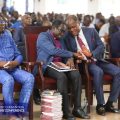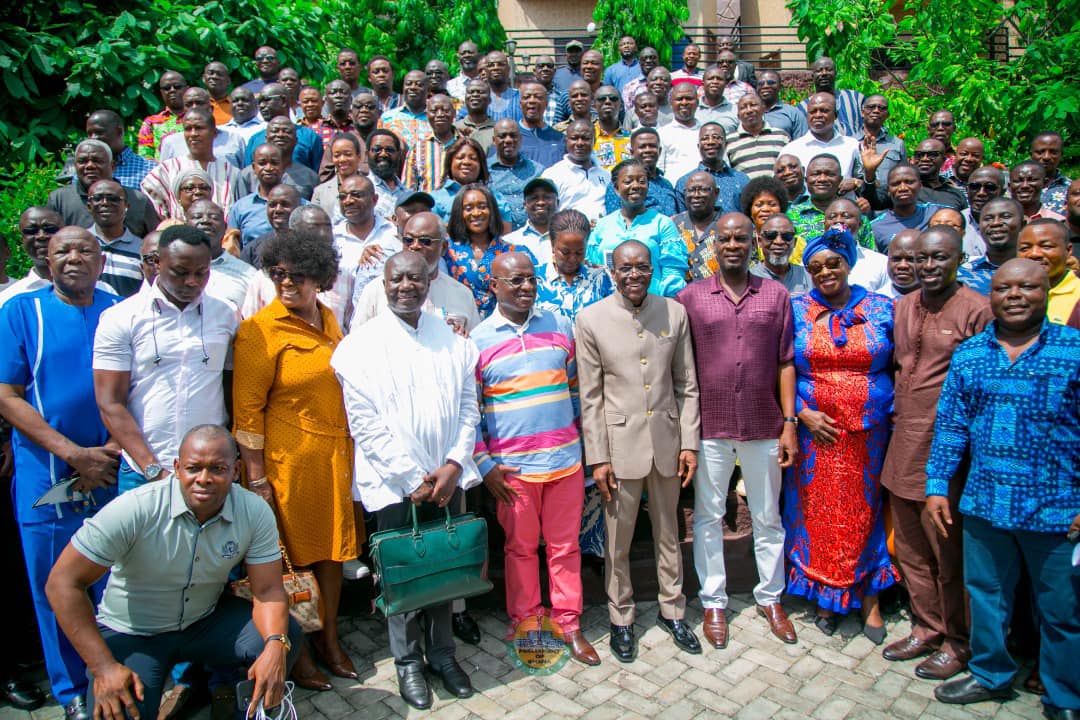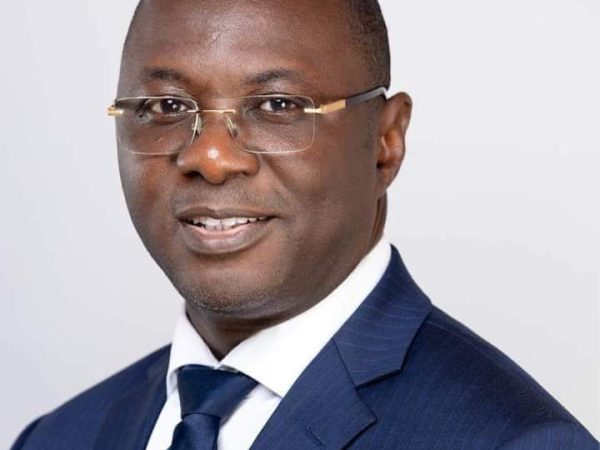Post Budget Workshop: Speaker Charges MPs to Commit Services to the Citizens
The Speaker of Parliament, Rt Hon Alban Bagbin has charged Members of Parliament to remain loyal and committed to the aspiration of the people they serve rather than their political parties.
According to him, the citizens have lost hope in the executive arm of the government and have therefore relied on the legislatures to relieve them from the challenges they face.
Rt Hon Speaker made the call at the opening ceremony at the three days Post Budget Workshop of the 2023 Budget and Fiscal policy of the government on Saturday, November 2022, at Ho in the Volta Region.
Members of Parliament converged at the Volta Serene Hotel in Ho for a post-budget workshop.
The workshop is to allow the MPs to discuss the policies outlined in the 2023 budget statement presented to Parliament on Thursday, November 24.

Addressing the MP, Rt Hon Bagbin said, “we must keep in mind the promise we made to the people of Ghana: to give them a reason to aspire for a better future. What use is parliamentary democracy if it does not present Ghanaians with the chance to attain their full potential and the prospects of a future defined by a drive toward social and economic development and growth?
“It is important that we place improving the lives of those we serve at the top of our priorities as a country. It was the Dalai Lama who said “if we develop concern for other people’s welfare, share other people’s suffering, and help them, ultimately, we will benefit. If we think only of ourselves and forget about others, ultimately we will lose. The more we care for the happiness of others, the greater our sense of well-being becomes”. In doing so, let us eschew unbridled partisanship, given that the budget’s primary goal speaks to common the issues that affect us all,” Rt Hon Bagbin said.
He added, “Let us collectively as the legislature commits to fixing this economic turbulence. If there was any time in the history of this country that Ghanaians are looking up to the Legislature – not the Executive – for solutions to the challenges confronting us as a people, it is now. That is why we must, for now, consign partisanship to the background and bring our nationalism to the fore in the decisions that we take and the issues we support.
“We have a fine opportunity to assert the independence and relevance of parliament in the governance of this country. Else, posterity will remember us as the crop of legislators who sacrificed Ghana on the altar of partisanship,” he said.
The Majority Leader, Hon Osei Kyei Mensah Bonsu charged MPs to fully participate in all sections of the workshop so they could contribute to the budget.
He said the workshop was not only to scrutinize the budget but help the nation reshape its financial resources direction as to how best as a nation we intend to move with the turbulent economy.
The Minority Leader, Hon Haruna Iddrissu said the Minority side was ready to help the government to sustain the epilepsy economy but would not support policies that sought to impoverish the citizens.
He said the introduction of 2.5 per cent of Value Added Tax(VAT), the E-levy threshold of any transaction would further make Ghanaians poorer and they would resist such policies.
The Clerk to parliament, Mr Cyril Kwabena Oteng Nsiah charged the MPs to participate fully as the post-budget is the only way by which parliament could help scrutinize the budget and also enhance parliamentary oversight responsibility.
The Finance Minister, Ken Ofori Atta on Thursday presented the government’s 2023 budget statement in Parliament in accordance with the requirement under Article 179 of the 1992 Constitution of the Republic of Ghana.
The Minister outlined a seven-point agenda to boost the economy, including the 2.5 per cent increase in VAT and the review of the 1.5 per cent Electronic Transfer Levy rate to 1 per cent.
Mr Ofori-Atta further indicated that the increase in VAT is expected to yield GH¢2.7 billion.
According to him, these funds will be used to augment funding for road infrastructure development.
Below is the full Speech of the Speaker
OPENING ADDRESS BY THE RT. HON. ALBAN SUMANA KINGSFORD BAGBIN, SPEAKER OF PARLIAMENT, AT THE 2022 POST-BUDGET WORKSHOP AT HO IN THE VOLTA REGION ON SATURDAY, NOVEMBER 26 2022
I formally welcome you to this year’s post-budget workshop for Members of Parliament (MPs) and other supporting staff of the Parliamentary Service. Your impressive turnout today is an indication that our being here is grounded in one of the significant duties we have as lawmakers, and that is financial control or the power of the purse. The ultimate objective of this workshop is to offer each (MP) the opportunity of a deeper appreciation of the 2022 Budget Statement the government. The key expected outcome is quality discussions and debates on the budget on the floor of the House in the ensuing days.
Background to the 2022 budget
Honourable Members of Parliament, the times and circumstances we are in at the moment are extremely challenging. We cannot pretend and dismiss the obvious regarding Ghana’s severely disorientated economy, which is on a downward spiral. Things are getting tougher by the day. Some may assert that there is a global economic crisis, but others will present data suggesting that there are African countries whose economies have been better managed, and are currently doing well. The data and its analysis will also show that our economy took a nose-dive long before the recent global developments impacting some countries severely. Ghana is certainly not one of them. Our challenges are largely a result of our own doing.
The mess in which our economy is has led us to seek solace in the International Monetary Fund’s (IMF) interventions for countries that as similarly distressed. We have been courting the IMF for some time now, and it is the hope of every Ghanaian today that the overtures to the IMF will bring some relief to Ghanaians. The IMF negotiations should not continue to look like a suitor pursuing an unresponsive suitress. For now, that is how Ghanaians feel because we are in the dark so far as progress on the negotiations is concerned. We must bear in mind that whilst the absence of transparency can lead to suspicion and a profound sense of insecurity among Ghanaians, Park Won-Soon, the former mayor of Seoul in South Korea says “transparency increases credibility and accountability”.
Meanwhile, the concerns of Ghanaians regarding the high rate of inflation, high-interest rates, the never-ending increases in fuel prices, depreciation of the Ghana cedi against the major currencies, unemployment, the impact of liquidity challenges, and the consistent, daily increase in food prices among others appear to have no end in sight. It is a desperate situation for all of us. In today’s Ghana, we are told that you do not haggle over prices of items: just pay, collect and go because the price will increase, should you go without buying, and come back later to buy.
It is in the context above that the 2022 budget statement was presented to us this week by the Finance Minister for our consideration and approval. Our work, therefore, is cut out for us. To what extent does the budget provide solutions for our economic challenges in the short, medium and long term? How does it reflect the negotiations with the IMF and the path to economic recovery that has been mapped out? Again, unfortunately, we have not been updated on the negotiations. Will the budget stem the deterioration in such macroeconomic indicators as inflation, interest rates and exchange rates among others? Most important of all, what are the initiatives in the budget that will bring respite to the majority of our constituents who are under severe social and economic pressures as a result of the mismanagement of the economy? These are some of the issues we ought to be looking out for as we go through this workshop.
Today’s context and the MP’s charge
Honourable Members of Parliament, it is imperative that we keep in mind the promise we made to the people of Ghana: to give them a reason to aspire for a better future. What use is parliamentary democracy if it does not present Ghanaians with the chance to attain their full potential and the prospects of a future defined by a drive toward social and economic development and growth? It is important that we place improving the lives of those we serve at the top of our priorities as a country. It was the Dalai Lama who said “if we develop concern for other people’s welfare, share other people’s suffering, and help them, ultimately, we will benefit. If we think only of ourselves and forget about others, ultimately we will lose. The more we care for the happiness of others, the greater our own sense of well-being becomes”. In doing so, let us eschew unbridled partisanship, given that the budget’s primary goal speaks to common the issues that affect us all.
Let us collectively as the legislature commits to fixing this economic turbulence. If there was any time in the history of this country that Ghanaians are looking up to the Legislature – not the Executive – for solutions to the challenges confronting us as a people, it is now. That is why we must, for now, consign partisanship to the background and bring our nationalism to the fore in the decisions that we take and the issues we support. We have a fine opportunity to assert the independence and relevance of parliament in the governance of this country. Else, posterity will remember us as the crop of legislators who sacrificed Ghana on the altar of partisanship.
It reminds me of the author, William Shakespeare, who wrote “there is a tide in the affairs of men which, taken at the flood, leads on to fortune. Omitted, all the voyage of their lives is bound in shallows and in miseries. On such a full sea are we now afloat, and we must take the current when it serves or lose our ventures.”
We too readily assume that everything must have two sides and that it is our responsibility to be on one side or the other. I frequently notice that some of our options as leaders only serve to highlight our partisanship and blind loyalty. For the benefit of the very citizenry who elected us as leaders, we must remain true to those courses that serve them well. Today as we gather here, they are not in a good place. I am compelled to join in the chorus “krom ay3 shii,” which is often echoed by many Ghanaians on the street. Indeed “krom ay3 shii”: which literally means “this town is too hot!”
Post legislative scrutiny
Participants at this workshop, we need to do more than just approve the budget, sit back and just watch the government spend. We must increase our monitoring of government expenditure to ensure value for money for the people of this country. It calls for analysis of the fiscal impact of policies and laws arising from the budget. The pace at which government programmes and policies are implemented and the expenditure rollout needs monitoring. Parliament must ensure that the interventions in the budget are implemented as intended. Making sure that approved laws and policies benefit citizens in the way that they were intended to is the overarching goal of our duty as legislators.
Strong oversight by parliament over the executive holds a lot of value for citizens. Wen Jiabao, a former premier of the People’s Republic of China, stated that “the Legislature’s monitoring and critical oversight is the only way the government will be able to do an even better job.” Effective oversight generates momentum toward sustainable development through enhanced legislation and policy. We must remember that our responsibility as legislators is to speak to what the budget contains for our constituents.
Honourable Members, in the global village we now inhabit, trends, data and evidence guide policy and decision-making. When reliable information, analytical tools, and supporting evidence are presented in advance, members will have a better understanding of the issues and debate the budget more competently as representatives of the people. Consequently, if a post-budget workshop like this one is critical, then a pre-budget huddling of some sort is also essential for purposes of deeper understanding, consultation and compromise. MPs will be better able to comprehend the themes covered during the post-budget workshop if they confer with the relevant ministries in advance. This will give them an advantage when they are debating and evaluating policies.
Conclusion
I pray that as Honourable Members of Parliament, we will work together at this workshop and hereafter to serve the interest of our constituents as we prepare to consider and approve the 2022 budget statement. What we need is a melting pot of all differences, extreme positions and biases, and a move toward consensus and compromises that will place this economy of ours on a revitalized pedestal.
I now have the honour and privilege of announcing the official opening of the 2022 post-budget workshop for Members of Parliament. I wish you a fruitful deliberation and thank you for your time and attention!
Source: expressnewsghana.com
Send your news stories and articles to expressnewsgh@gmail.com or via WhatsApp at +233 0543 900 732








